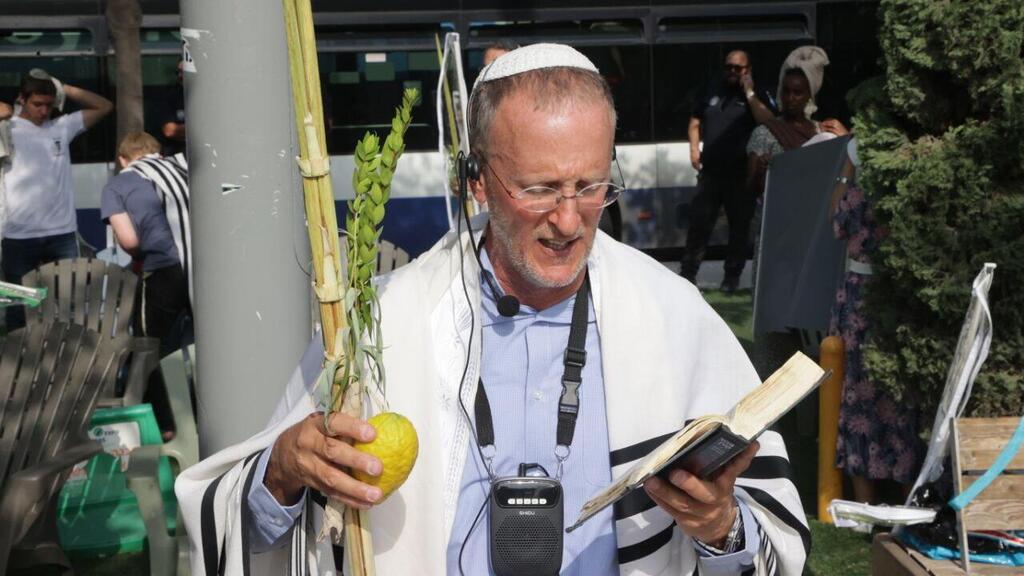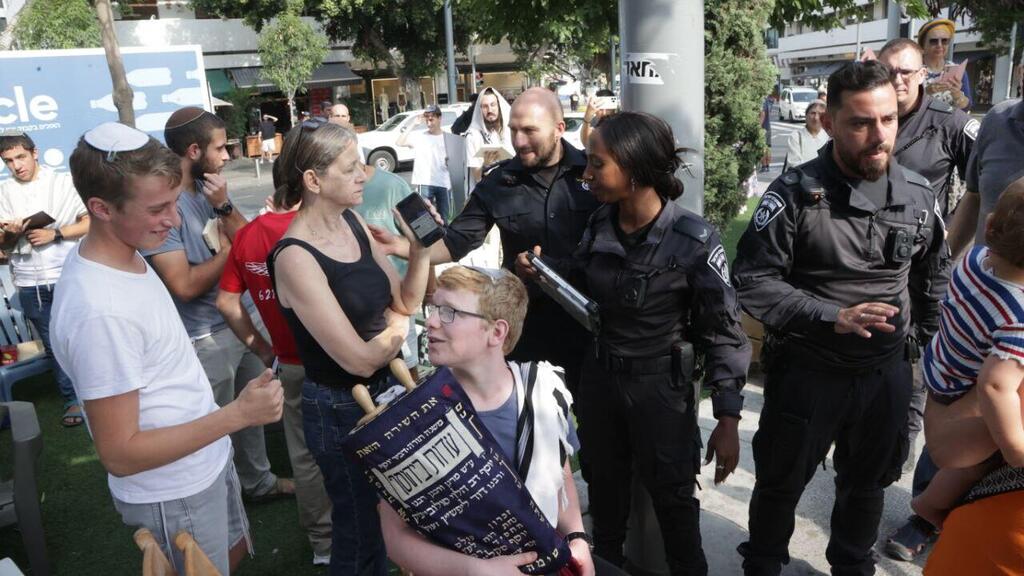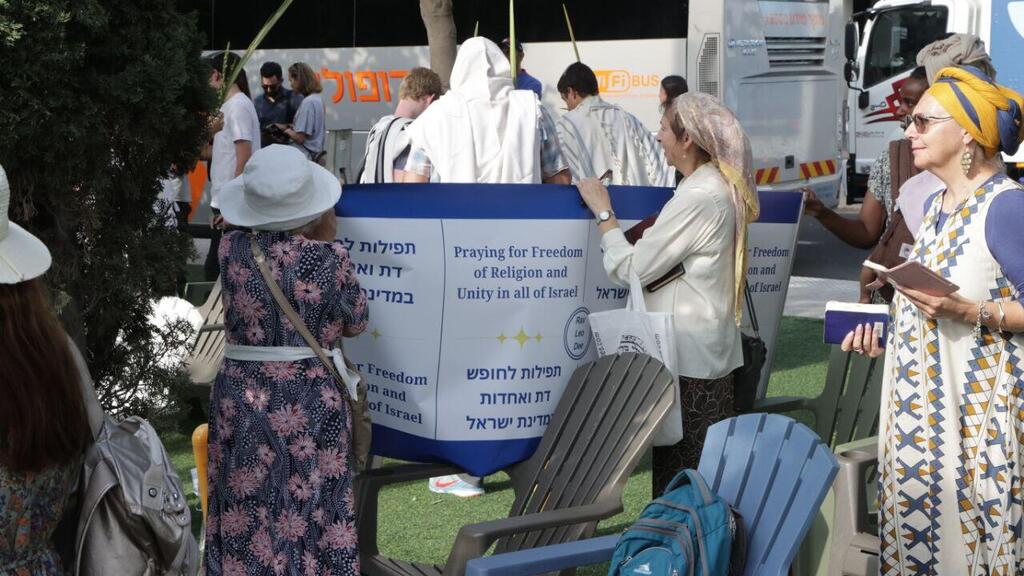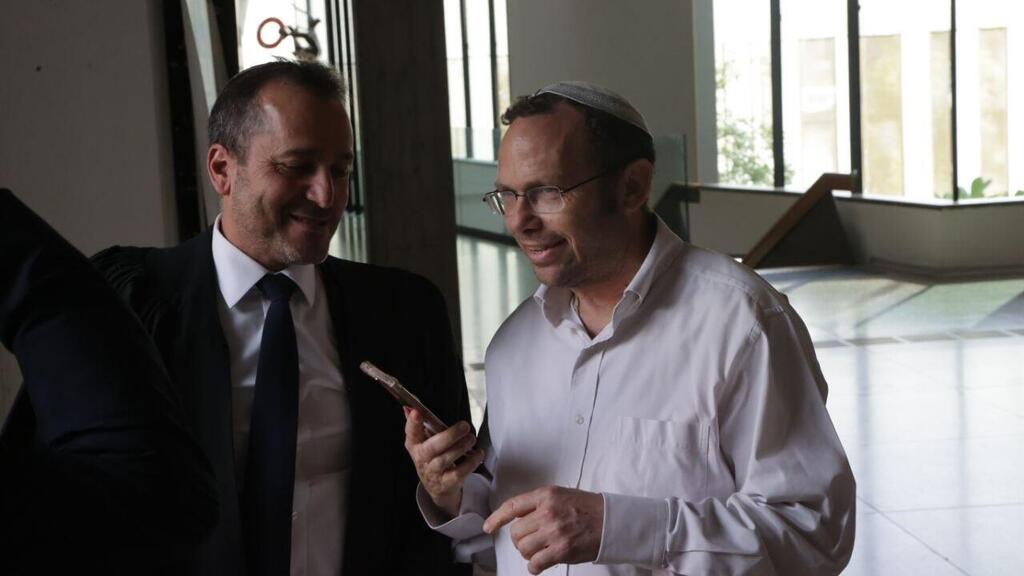Getting your Trinity Audio player ready...
Rabbi Leo Dee: 'We came here to support the people of Tel Aviv'
(ILTV News)
Morning prayers for the intermediate day of Sukkot were held Thursday morning in Dizengoff Square in Tel Aviv. Protesters arrived and there was some pushing and shoving, but organizers were satisfied that they passed relatively peacefully.
Rabbi Leo Dee: 'We came here to support the people of Tel Aviv'
(ILTV News)
More stories:
It was arranged by social activist Rabbi Leo Dee, the rabbi of the Efrat community in Gush Etzion whose wife Lucy and their daughters Maia and Rina were killed in a terror attack in April in the Jordan Valley. "It is our right to pray with a partition, without a partition, whoever wants and however they want, this is the true freedom of religion," he told Ynet.
"It went fantastically well, we had a nice turnout ... it was very peaceful," Dee said of the service attended by dozens of worshipers. "And we proved to the people of Tel Aviv, who wanted us to come, to support them to show them that it is possible to pray as a Jew, even in Tel Aviv."
"We have human rights, and part of that is that we can pray anywhere we like and even if we want to pray separately with a partition, we can do that too," Dee said. "This prayer was for religious freedom in Tel Aviv. He (the mayor) probably wants to turn Tel Aviv into Soviet Russia where religion is the state and everyone is the same."
4 View gallery


Rabbi Leo Dee leads a Sukkot prayer service at Dizengoff Square in Tel Aviv
(Photo: Moti Kimchi)
He called on the Supreme Court to change its recent ruling allowing the Tel Aviv municipality to ban gender-segregated prayer in public spaces.
The Thursday morning prayer service comes more than a week after clashes erupted at Dizengoff Square on Yom Kippur Eve between hundreds of Tel Aviv residents and the organizers of a Kol Nidre prayer service in the city. Organizers from the Rosh Yehudi organization used Israeli flags as a makeshift partition, contrary to a court ruling and the decision of the Tel Aviv-Yafo municipality which disallowed gender-segregated prayer, though most people at the service were sitting in mixed groups. Following the incident, the municipality canceled permits for Rosh Yehudi to hold public events for Sukkot.
Sukkot prayer service at Dizengoff Square
(Video: Moti Kimchi)
Also on Thursday morning, Rosh Yehudi appealed to the Supreme Court against the decision of the District Court in Tel Aviv, which on Wednesday night rejected its petition against the Tel Aviv Municipality regarding the cancellation of the permits given to the organization to erect a Sukkah and hold other holiday events in the Dizengoff Square area.
"If the mayor of Tel Aviv doesn't agree with us then that is his mistake. And if the Supreme Court does not agree with us that is their mistake. We want them to change the law so that even Jews can pray in public places without fear," he said.
Several people told me that I am completely secular, I never pray, but I came today because of what happened in on Yom Kippur
In videos of the service posted online, a man is seen pushing Dee, who is wearing a tallit and carrying the four species. Several people protesting the prayer service were on the sidelines of the event, as well as police officers. There was some pushing and shoving, and some protesters attempted to disrupt the service using megaphones.
Dee told Ynet: "There was no violence, there was a lovely and dignified prayer. Several people told me that I am completely secular, I never pray, but I came today because of what happened in on Yom Kippur. There were maybe 5-10 people who disturbed and made noise but it was fine and they didn't disturb me. We prayed for an hour and a half and finished the prayer despite the people who came to interrupt who do not believe in freedom of religion and human rights."
A partition that had been erected for the service was dismantled by city inspectors ahead of the service, though most people who attended sat separated by gender, though there were attendees who in mixed gender groupings.
4 View gallery


Police on the sidelines of the Sukkot prayer service at Dixengoff Square in Tel Aviv
(Photo: Moti Kimchi)
"We came here from all over Israel to support the people of Tel Aviv because I know that the religious people in Tel Aviv are running scared of the people who shout and want us to leave and actually the police are not protecting them, the mayor of Tel Aviv is not protecting them the Supreme Court is not protecting them so they are locking themselves in their synagogues and they are very worried," Dee also said.
He called on all religions to pray in the streets of Tel Aviv, and noted that there are other sex-segregated events, such as yoga classes in the park for women, that the mayor does not order to be mixed gender.
In the district court decision on Wednesday night upholding the decision to cancel the Rosh Yehudi events Judge Magen Altuvia wrote that he believed that the parties should "come to an understanding", and that in the spirit of the holiday there should be "unity and reconciliation." A discussion between the sides on Wednesday in his chambers, which took place behind closed doors, was intended to achieve this, he said, but the parties were unable to reach an understanding.
Altuvia ruled that "administrative law gives the court limited authority to intervene in the decisions of a governmental authority," and added that "I cannot accept the position of the petitioner (Rosh Yehudi) that the respondent (Tel Aviv-Jaffa Municipality) applied extraneous or invalid considerations" in its decision to cancel the permits.
Altuvia reiterated that "the petitioner violated the conditions of the permit given to it for the Yom Kippur event, by setting up a stage without a permit, which created a partition and constituted gender segregation in practice, and hung ropes and flags without a permit, including on the fountain in the square, without permission." According to him, this conduct took place immediately and shortly after the Supreme Court, following the District Court, approved the condition set by the municipality regarding the non-establishment of physical separation.






